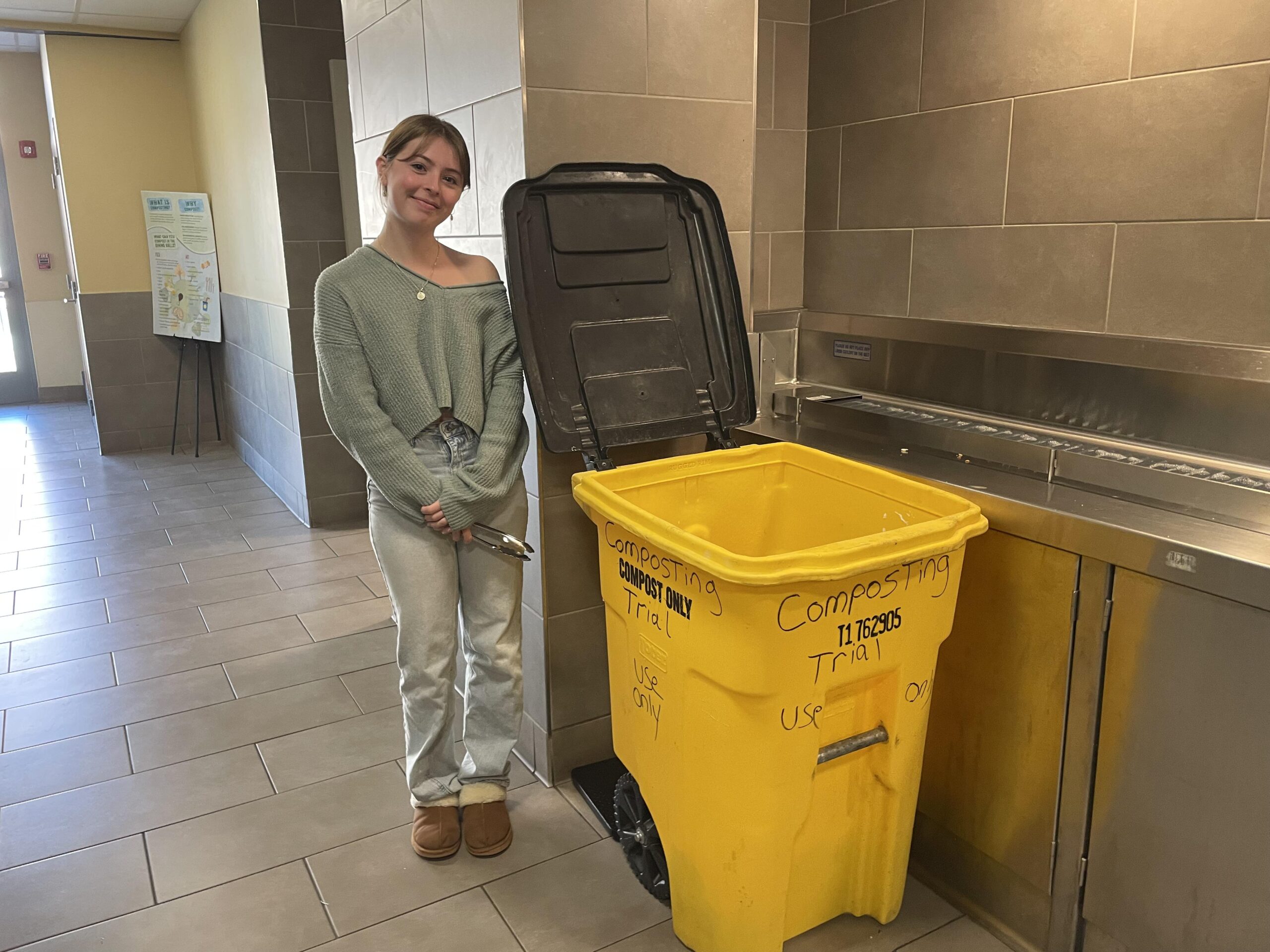In a recent effort to encourage sustainability at the University of Rhode Island, students and dining services staff have been working to integrate composting into the dining halls.
Pierre St-Germain, the director of dining and conference services at URI, began working on this project five years ago, however, the project has been ongoing for about seven years.
“I think it’s a worthwhile endeavor and something that needs to be adhered to in colleges and universities throughout the nation,” St-Germain said.
Dylan Murdock, a second-year student majoring in sustainable agriculture and food systems, is the current president of the Student Action for Sustainability Club. After completing an assignment related to sustainable agriculture, he felt he could introduce a similar project at URI and began working with dining services.
Murdock first connected with dining services to collaborate on this project about a year ago and it has been ongoing ever since.
“I want to jumpstart the sustainability field and department at URI,” Murdock said. “I want to make it a part of their identity for the future.”
Murdock has organized this project to include compost bins in the dining halls and student ambassadors who monitor what students are putting in.
Among a few of the initial challenges was receiving enough funding for the project. Katharine Flynn, director of the URI Foundation & Alumni Engagement’s Corporate and Foundations unit, was able to help with this and connected with the Schmidt Family Foundation.
The Schmidt Foundation is a supporter of t he 11th Hour Project, which focuses on sustainability and aspects of agriculture such as composting.
URI was able to secure a $250,000 grant from the 11th Hour Project, which helped to jumpstart the project and guarantee its continued success until at least the end of the spring semester in 2025. At that point, the foundation will assess whether they will contribute a second round of funding, Murdock said.
Jonah Steinweh-Adler, former Vice President of Student Body and a third-year student majoring in history and journalism, has also been a prominent figure in the ongoing process of creating this project.
“Since the beginning of the school year, it’s been a whole process of meeting with the dining services, mapping out what the position would look like and understanding what the funding was going to be like,” Steinweh-Adler said.
The goal of the project is to have students be self-sufficient and educated enough in composting to know how to properly dispose of their food waste, Steinweh-Adler said. Student ambassadors have been overseeing the project in the dining halls each morning.
At the start of the project ambassadors were able to negotiate and change their rate from $14.50 to $16 per hour to account for the various tasks they might need to complete. In addition to monitoring composting bins, they are responsible for gently encouraging students to participate and taking anything out of the bins that may not be compostable.
“It’s the first green job for students,” Murdock said. “It’s a paid position that also offers credits.”
Katie Field, a fifth-year student who is a mechanical engineering and German major is a recent addition to the ambassador staff, which currently has five employees.
“I just want to help the environment and help the school become more green because that’s one thing the school is lacking,” Field said.
For the past several years, pre-consumer composting has been useful in transitioning the campus to more sustainable practices, according to Murdock. With front-end composting, over 3,700 pounds of food waste have been collected. This averages about 250 pounds of food waste per day.
Pre-consumer composting involves composting during the manufacturing process, while front-end composting allows students to take charge of the recycling process.
In addition to the Mainfare and Butterfield dining halls, Ram’s Den, the catering services, the Daily Grind and the catering bakery have been utilizing pre-consumer composting.
“It requires a traditional dish area for that to work,” St-Germain said. “They couldn’t put the bins in the middle of the Ram’s Den, so they’re only able to do post-consumer composting and technically catering.”
Post-consumer composting means that the product you’re using is garbage or waste that has already been used by a consumer, according to Mass.gov. It is then disposed of and diverted from landfills.
Overall, the project has gained speed and aims to reduce waste on a grand scale by making composting a part of student culture, which will take about three years to complete, according to Murdock.
“This club is like a spoke wheel,” Steinweh-Adler said. “We have the club in the center, but we have all these different ideas that come out of the center. We’re trying to do composting, we’re trying to do culture change, we’re trying to reestablish a sustainability director.”
The dining hall staff has also been working to make this a common practice for students by accepting feedback through the dining survey.
“Every time we do this we take the requests and try to bring them to life,” St. Germain said. “If we can’t make a change we go to the senate and ask why we can’t make the change. We take student feedback very seriously.”
SAS will continue to support and develop this project while working on more for the future.
“By far and wide, this has been our big thing that the team has been working on the whole,” Murdock said. “A lot of countless hours were spent. We are also working on at least two more projects for the future.”
Look out for more sustainable projects from SAS in the future.

